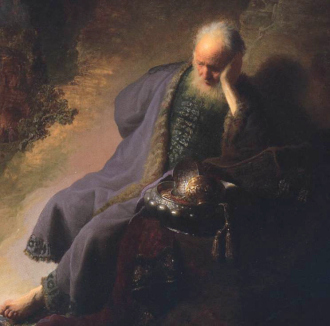Jeremiah was called, early in life, to serve during King Josiah of Judah's 13th reigning year in 627 B.C. At the time of his calling he was young (possibly 20 years old) and initially protested to God that his youth prohibited him from doing his will. He was not allowed to have a wife or children (Jeremiah 1:1 - 2, 4 - 6, 16:2).
Jeremiah's ministry lasted through the rest of Josiah's reign and the reigns of the Kingdom of Judah's last four rulers (Jehoahaz, Jehoiakim, Jehoiachin and Zedekiah). He wrote the books of Lamentations, Psalm 89 and the last part of 2Kings. The book that bears his name is the second longest one in Scripture in terms of the number of words in contains.
The prophet's life was one of, if not the most, difficult and trial filled existences of any of the Old Testament prophets. Because of what he saw, preached and suffered, he is often referred to as "the weeping prophet."

At the start of his prophetic ministry, he was told directly by God that others would reject him and his message. After preaching for several years, his own family and those who lived in his hometown turned against him. They despised him and his message so much that they plotted to kill him (Jeremiah 1:8, 11:21 - 23, 12:6).
Beaten and Abused
Pashur, a chief governor and priest in Jerusalem's temple, had the prophet whipped then put in stocks (Jer. 20:1 - 3). During the reign of Jehoiakim, after he gave a temple message calling for the people to repent, a mob of priests and prophets tried to have Jeremiah executed (26:1 - 9). King Jehoiakim himself would later threaten his life and that of his scribe Baruch (36:26). A false prophet named Hananiah publically ridiculed his warnings and accused him of lying (Jer. 28).
Some of Zedekiah's princes, after he became Babylon's puppet king over Judah, had the prophet arrested, accused of treason, beaten and thrown in prison (37:1 - 15). Others who also rejected his message then had him moved from the palace prison into a deep but empty well where he sunk into its mire (38:1 - 6).
Jeremiah personally experienced the Babylonian siege against Jerusalem and not only saw the suffering of the people but also saw them taken away as captives (38:28, 39:9). After the destruction of Jerusalem, the Babylonians released him from prison and allowed him to live in the land under the protection of governor Gedaliah.
Unfortunately the governor, less than two months later, was murdered. The prophet was then, against his will, taken by some Jewish rebels to Egypt (Jeremiah 40 - 45). Some Biblical commentaries have speculated that the prophet died in Egypt at the hands of those who forced him to leave.
Noteworthy Prophecies
Jeremiah the prophet, early in his ministry, warned the people to repent and turn their hearts toward God (Jer. 2). If they did not do this, they would be conquered and destroyed, and neither Assyria nor Egypt would be able to help them (2:18, 26).
In the same year Nebuchadnezzar became king of Babylon (605 B.C.), the prophet warned the people to turn from their evil ways or else suffer destruction at his hands (Jer. 25). After the Kingdom of Judah was conquered and Jerusalem destroyed, he prophesied that after 70 years of captivity the people would be brought back to the land (29:10 - 14).
God commanded Jeremiah to wear, and then send, yokes to the kings of Edom, Moab, Ammon, Tyre, and Sidon. This was done to warn these kingdoms that they would soon be overtaken by Babylon's King Nebuchadnezzar. If they repented of their sins, they would be allowed (though conquered) to remain where they live. If they refused repentance they would be destroyed (Jer. 27:1 - 11).
Concerning the Messiah, Jeremiah predicted the life of innocent children would be taken in the search to kill Christ as a child (Jer. 31:15). He also prophesied that a New Covenant would someday be offered to Israel (and, by extension, the world - 31:31 - 34). A descendant of David (Jesus) was also foretold to rule the earth in the near future (23:5 - 6).